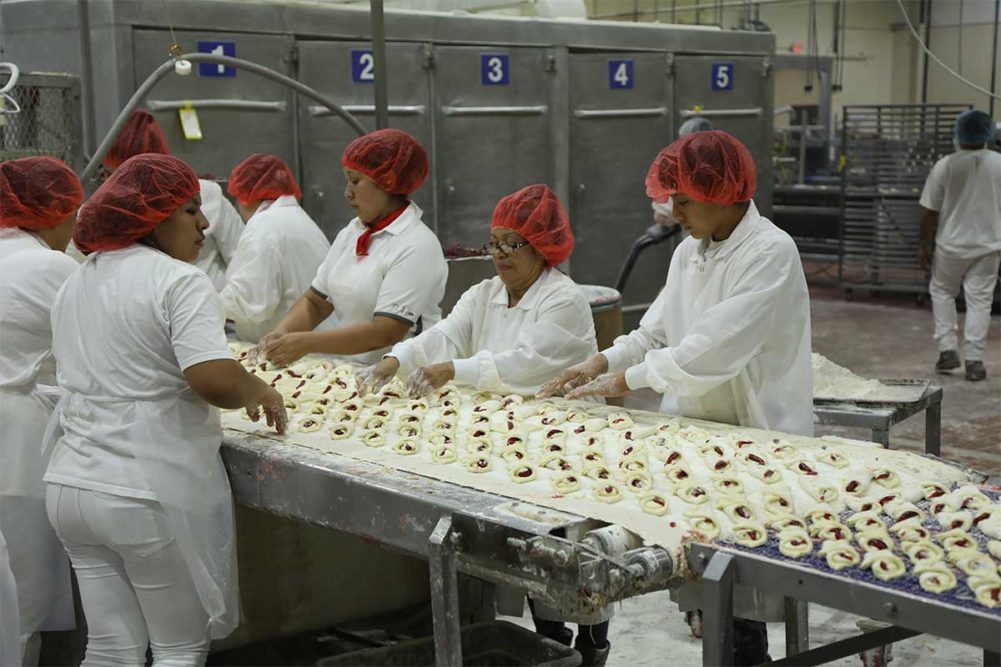The James Skinner Baking Co. has a core group of employees at its Omaha facility, where the company is headquartered, that have been with the company more than five years and provide a know-how and consistency for the bakery, but about a quarter of newer workers have a higher rate of churn, which is challenging. The company employs 850 full-time employees, and 475 are based in Omaha.
“We’re blessed with retention, people who’ve been part of the family,” said Audie Keaton, president and chief executive officer at Skinner Baking.
But he explains how human resources today serves a much different purpose than it has in the past.
“HR is about career paths,” he said. “If there’s anything we’ve been taught over the last few years, it’s that employees are not a guarantee by any stretch. There’s a commitment you have to make to them. We have to facilitate that as leaders in our company. We have to give them the means and the path, and you’ve got to develop those relationships with your community. It’s not a one-way street.”
The company is committed to training and educating employees both on the floor and through a variety of programs to help workers improve skillsets and move up.
“In the past three years since I’ve been here, more than 50% of the team in management came from the floor up,” said Tom Lensing, vice president of operations. “We encourage that, and we spend a lot of time mentoring the employees on the floor. The folks working on the line become leads, the leads get promoted to supervisors. It’s worked well for us. Retention is good in those areas. We want them to see this as a career, not just a job.”
They also provide management programs like conflict resolution and make communication with employees a priority, something that fosters trust and respect among employees and managers.
“We don’t answer to stockholders, so we get to share everything with our employees,” Mr. Keaton said. “The only way you can have honesty and integrity in a business is if you’re transparent. If I’m expecting that from the people who walk in these doors — from Tom, from anybody who manages here — I have to give the same thing in return. And we do that. That level of engagement empowers people. They see it, and they trust it.”
The bakery has engaged with some local programs to help provide a conduit for new employees. One provides culinary training for Omaha youth, and another is an upgrade to an area technical school that will provide training in automation, something Skinner Baking has identified as a critical need.
“We had to increase our bench strength when it came to this area,” Mr. Keaton said. “I sit on a couple of boards that are local universities. We didn’t have a curriculum for robotics.”
The Fremont, Neb., Public Schools passed a $123 million bond issue facilitating automation and robotics training in the school’s Career & Technical Education Center. Skinner Baking will provide a jobs partnership.
“We knew we had a need, and we’re real excited about this opportunity,” Mr. Keaton said.
Another important partnership has facilitated the need for automation and robotics help at Skinner Baking, and that’s with Schubert North America, which installed three pieces of equipment 18 months ago on the strip Danish line: a depanner, packaging machine and a case packer. It’s a partnership Mr. Keaton intends to expand into the foreseeable future.
“When they say turnkey, it’s turnkey,” Mr. Keaton said about Schubert. “It’s like painting. Ninety percent of painting is prepping. It’s the boring parts. It’s all the meetings, all the time, all the talking, everything that goes into it. Schubert puts that 90% in.”
Schubert is providing packaging equipment for a brownie line in the Paris facility and will assist with other expansion projects in the next few years. The company produces advanced technology systems, which are a combination of standard and custom elements. And the systems require the right people to help maintain them.
“If you’re going to buy a race car, you better know how to drive a race car,” Mr. Keaton said. “If you’re going to buy a Schubert, you better make an investment. Your run-of-the-mill mechanic, your duct tape and bailing wire would be an insult to this type of equipment. You have to make that investment and have that core group of people get behind it.”
Skinner Baking is heavily reliant on manual labor, and the three robotic solutions on the line helped the bakery cut down on labor as well as solve the tricky problem of depanning coffee cakes in tin foil pans.
“How many depanners have we bought in the last four years, five years? I can’t tell you,” Mr. Keaton said. “We have bought depanner after depanner after depanner only to have it fail in the first month. We’ve spent millions on trying to depan coffee cakes. Schubert nailed it. Not only did they nail it, but it’s perfect.”
Pans that hold four coffee cakes have holes, allowing the equipment to push the foil tins up from the pans, which can then be transferred to belts. As the product comes out of the freezer, robotic arms pick each foil Danish tray and place it in a clamshell.
The number of arms on the equipment provides redundancy and efficiency. Loaded clamshells are then discharged to existing equipment.
This article is an excerpt from the September 2022 issue of Baking & Snack. To read the entire feature on James Skinner Baking Co., click here.





